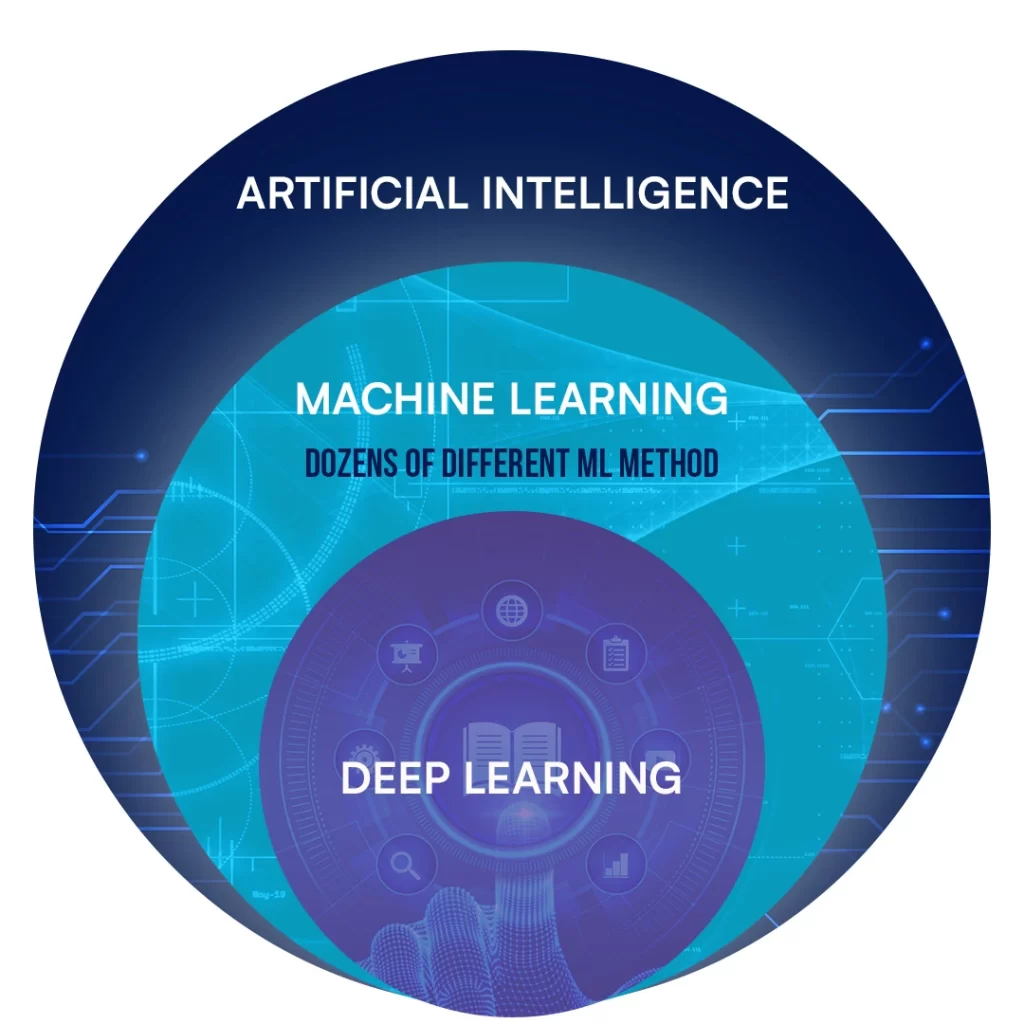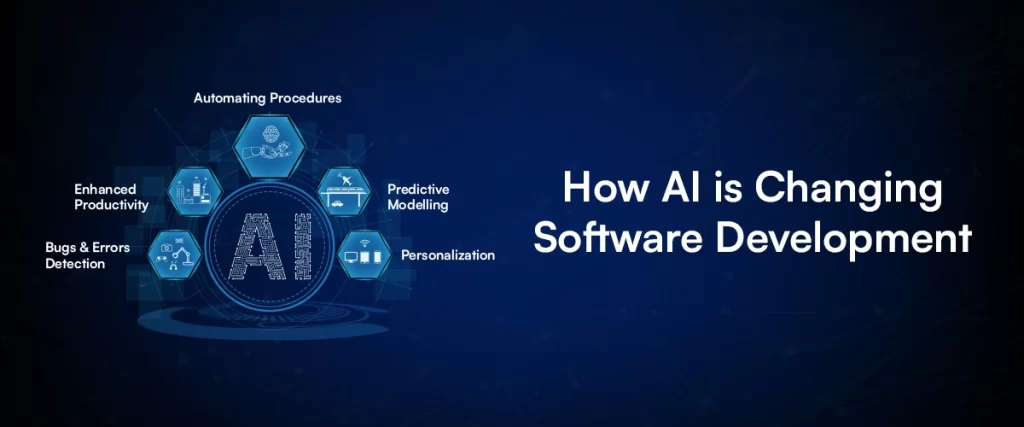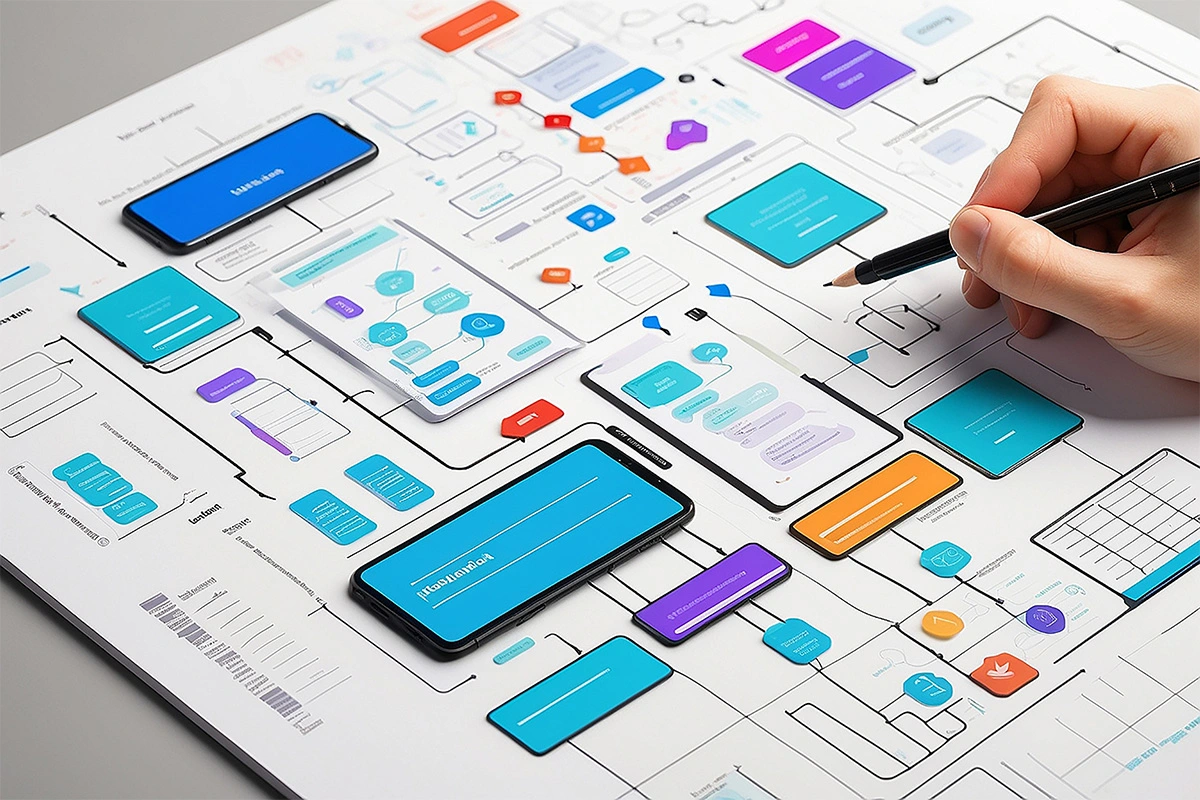We will explore the benefits of AI software development, from its pervasive presence in our daily lives and the future it is helping to shape, to its revolutionary effects on a wide range of businesses and specifically the IT industry. Artificial intelligence (AI) and machine learning (ML) are having a profound effect on organizations by improving their ability to analyse data, automate processes, and make better decisions. We develop and manage AI and ML systems to carry out tasks that are beyond the capabilities of people or that need too much time and effort to accomplish manually. Tools and solutions based on artificial intelligence (AI) and machine learning (ML) are becoming increasingly important in the field of software engineering. In this blog, we’ll look at the substantial effects that AI is having on the day-to-day workings of tech organizations and how artificial intelligence is being put to use there.
What is AI?

Artificial intelligence (AI) is the endeavour to create a machine or computer program that can successfully mimic human intelligence. Particular uses of artificial intelligence include expert systems, the processing of natural languages, speech recognition, and machine vision.
Machine learning (ML) is a branch of artificial intelligence that allows computers to “learn” from experience and make decisions based on that knowledge.
Spellcheckers and grammar checkers are good examples of ML since they evaluate text based on a dictionary and grammatical rules and then highlight mistakes. Amazon Alexa is a practical application of ML since it adapts to our speech patterns and becomes more effective as we use it.
Role of AI in Software Development
Algorithms developed by artificial intelligence can boost project planning, aid in automated quality assurance, and enrich the user experience. A recent study indicated that developer productivity was multiplied by 10 when AI was used in software development.
AI’s innate talent for self-improvement makes it ideally suited for the myriad jobs and components that go into creating and maintaining programs. The tremendous breakthroughs in AI have had a significant impact on the software development industry. Some of the ways in which AI is improving the development and implementation process are discussed below.
The Automation of Help through Natural Language Processing:
Natural language processing (NLP) is a subset of artificial intelligence and machine learning that facilitates programmatic comprehension of natural language communication. Using information from existing service channels, chatbots create an experience that is more human-like for customers. With the use of data analytics, the support bots can learn from the growing body of customer service data being sent into these platforms.
The Rise of Generative AI:
Software engineers have been incorporating AI and ML for some time, but only recently have we seen the rise of generative AI. Users can now ask ChatGPT and Bard intelligence software to write on any topic they like using the platform’s built-in generative AI. Developers have also come to appreciate the importance of application programming interfaces (APIs) and generative AI for writing code and accelerating the development process.
APIs and Generative AI Capabilities:
The idea of application programming interfaces (APIs) has been around since the early days of computer technology. They allow for the transfer of information and services between other programs, making cross-platform communication much more efficient. The advent of APIs was crucial in the shift from monolithic to micro-service design, which accelerated the creation of specialized programs. Developers can boost the effectiveness and scalability of their products by utilizing generative AI software tool APIs. Incorporating generative AI into this framework is a natural step that will help programmers make their apps more effective and scalable.
Software Designing:
In order to suggest a reliable solution, software design necessitates both specialized education and practical expertise. Artificial intelligence (AI) tools can automate complex procedures, such as AIDA (Artificial Intelligence Design Assistant), which helps designers learn about the client’s wants and needs in order to create a product that meets those specifications. AIDA is a website creation tool that analyzes different iterations of software design to provide a solution that is tailored to the individual user.
Automatic Code Generation:
By pre-writing code, Automatic Code Generation reduces costs and delays in the development process. The use of AI tools and natural language processing can minimize the load of coding. Artificial intelligence in software development can change the narrative by translating concepts expressed in natural language into code.
AI-powered Testing:
Automatic testing with machine learning or deep learning can save time and ensure that more possible outcomes are explored. Quality assurance relies heavily on AI because of the significant mistake rate associated with manual quality assurance procedures. Artificial intelligence (AI) should be used by programmers to automate mundane tasks and cut down on wasted effort. Coding can also benefit from AI, which can make it easier and more efficient.
Time Management and Strategic Decision Making:
AI can make decisions, estimate costs and timelines, and advice programmers on how to optimize software rollouts. It is estimated that 80% of companies are spending money on artificial intelligence and that 50% have begun developing AI strategies. Sentiment analysis is another area where AI is useful; it allows developers to better comprehend user comments and roll out improvements that are more likely to be well-received. Natural language processing can be used to extract the scope of improvements from every piece of customer feedback, while machine learning algorithms can determine the best time and place to release the product.
Deployment Control:
Software deployment has benefited from the use of AI technologies, which have increased efficiency and decreased the likelihood of failure. Artificial intelligence (AI) can protect developers from vulnerabilities during upgrades and lessen the likelihood of deployment failure. It also permits the use of machine learning techniques to examine the deployment procedure.
Elimination of Error:
Artificial intelligence can aid with error diagnosis and treatment without the need for human interaction, cutting down on expensive maintenance. When AI makes a mistake, it can utilize reinforcement learning to learn from the experience and avoid making the same mistake again. The information is retrained to prevent repetition of previous mistakes.
Benefits of AI:

Artificial intelligence (AI) has changed the software development industry by making developers and QA testers more productive, resulting in more stable and secure applications and improved tracking of data in motion. This has resulted in increased productivity, more stable software, and smoother information transfer.
Bugs & Errors Detection:
Developers can leverage AI systems’ ability to scan massive data sets and discover patterns and anomalies to help them locate and solve software defects.
Personalization:
Artificial intelligence systems can study user actions and adjust to meet their requirements, leading to more satisfied clients.
Predictive Modelling:
Predictive models built by AI systems using previous data can aid engineers in spotting and preventing future software problems.
Automating Procedures:
Artificial intelligence systems can automate mundane processses, freeing up developers’ time for more sophisticated, high-value work.
Enhanced Productivity:
The time and money spent on creating software may be cut in half if software development activities like code compilation and quality testing were automated by AI systems.
Future of AI in Software Development
The use of AI in the creation of new software is no longer an abstract goal. More than 1.2 million developers have already relied on GitHub Copilot’s AI to automatically generate code on their behalf.
Artificial intelligence (AI) is a potent tool for enhancing productivity and satisfaction. It will avoid errors and make crucial decisions, as well as recommend unique and tailored material for the user. Artificial intelligence (AI) has grabbed centre stage like never before, and it will soon be a need for developers. Artificial intelligence (AI) has the potential to speed up any process, and it is already having an impact in numerous industries, including software development. With more efficient developers, testers, and project managers, businesses may expect to create better software at lower costs.
Both LLMs and AI in general can be useful additions to the job of developers. Although machines will never be able to replace human ingenuity, they will progressively take on mundane chores like testing, freeing up developers’ time to focus on what they do best: being human.
Get in touch with an AI development company if you want to incorporate AI. Make the most of our AI-driven services today by contacting us.




